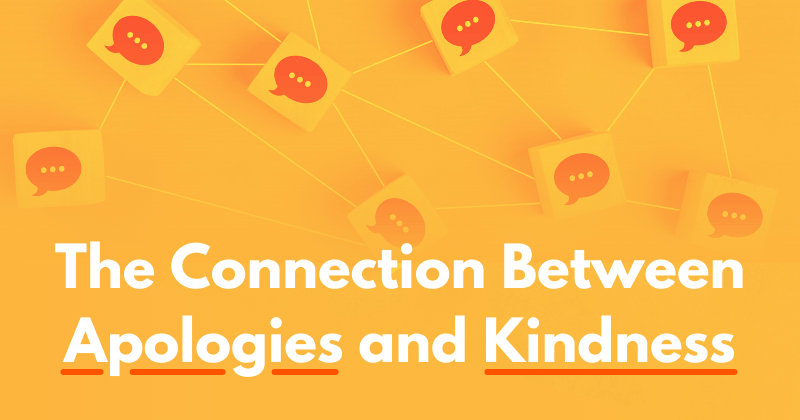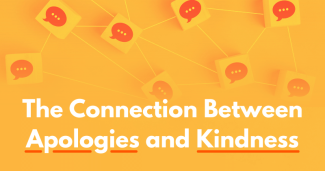The Connection Between Apologies and Kindness

[Editor’s Note: Here on our blog, MCN’s Director of Witness to Witness, Kaethe Weingarten, PhD, shares stories, resources, and helpful tips to support health care workers during these ongoing unprecedented times. Dr. Weingarten also offers a newsletter, filled with resources, recent articles, and her news and views. Sign up for the newsletter and grab bilingual resources on the Witness to Witness webpage.]
I have been interested in apologies and kindness for quite a while but today is the first day it occurred to me to ask if they are related. I am glad I did. My answer is a pretty simple one: if a person makes a mistake or hurts someone’s feelings, apologizing sincerely is a kind action to take. What happens next may be straightforward – apology accepted, no harm done, or vastly more complicated – depending on the situation that is being apologized for, the harm done, and the nature of the apology itself. A good apology can make the person harmed feel understood. A good apology is an act of witnessing, something we take very seriously at the Witness to Witness Program.
There are also situations in which a single, sincere apology is insufficient to repair the harm done by a thoughtless, violating, or violent action. Taking responsibility for one’s actions may involve accepting the gap between how we intend to make amends and what another person can accept from us. We may wish that good apologies would always repair harm, but this is not the case.
Health care settings have features that intersect with the subject of apologies. There is research to suggest that people who have positional power are viewed with more skepticism than people with less positional power when they offer apologies. For instance, a health care worker may think their unit manager is only apologizing because they know they should or because they want the worker to get on with the task at hand. A “boss” may have to work harder at apologies to be credible to employees. To further complicate the matter of apologies, it seems that women are more likely to think an apology is warranted than men and then to apologize more often when they deem it appropriate. It’s not clear how this works out in health care settings with a preponderous of women in all positions.
Yesterday, I wrote an email to a customer satisfaction representative pointing out that a video I had purchased that promoted itself as one that discussed racial bias in the workplace had only one person of color in it. Further, the narrator’s voice had the timbre I have come to associate with an older, white, male voice. The website had advertised that buyers had 30 days to view the video and then get their money back if they weren’t fully satisfied with the purchase. I was not asking for my money back in my email. My intention was just to point out that “it seems a significant contradiction to be discussing bias and then have mostly white workers represented.”
Much to my surprise, I received a reply almost immediately. “I'm sorry if it seems we only feature white people in the video. However, it's not the case.” The timing of the response was indeed a surprise but so was the content. The person was not apologizing for the video’s representation of diversity in the workplace, nor apologizing for the contradictory message sent by the absence of BIPOC people in the video. The person apologized for “seeming” to do something while telling me my perception was inaccurate. In other words, there was no actual apology.
It turns out that the email I received is part of a long tradition of non-apology apologies, many of which take the form of “I’m sorry if….” “I’m sorry if I hurt your feelings” does not convey the same meaning as “I’m sorry that when I mocked your accent, it hurt your feelings.” Better, but not as good as “I’ve been thinking about how hurtful it must have been when I mocked your accent. I made an insensitive comment and I feel bad about it. I know how hard you have worked on speaking English and how rightly proud you are of that. I fear I may have undermined your confidence, which I deeply regret. I was thoughtless as well as wrong. I realize that what I thought was fun and harmless was not. I have learned from this exchange, and I won’t do that again. To you or anyone.” The point of an apology is not to undo the past but to change the present.
A recent book published by Marjorie Ingall and Susan McCarthy, Sorry, Sorry, Sorry: The Case for Good Apologies, lays out six and a half concise and straightforward rules for a good apology. The beauty of the rules is that it applies to people of all ages and in all positions in life.
- Say you’re sorry.
- For what you did.
- Show you understand why it was bad.
- Only explain if you need to; don’t make excuses.
- Say why it won’t happen again.
- Offer to make up for it.
…And the additional half-step is to listen.
The authors have also produced a set of Bad Apology Bingo Cards that have many phrases that are part of common forms of bad apologies. These are some of my favorite expressions, with my interpretations of why they belong on the Bingo cards:
- To anyone who is offended…This seems to say, “I will apologize to you but it is your problem, really, that you are offended.”
- I regret what happened…Notice there is no one who did the action. It just happened.
- There is a lot going on in my life… This is an excuse, that seems to say, “…and that is the only reason I was such a jerk. If you are not a jerk, you will forgive me without requiring me to make a true apology.”
- Sorry you feel that way…This insinuates that you have a choice and you could feel a different way and not be hurt or upset by what I said since there is nothing I feel the need to apologize for.
- Those closest to me know…This seems to say, “that I am not the kind of person who would ever say or do something for which I would need to apologize.”
There are many more aspects to apologies than the ones I have mentioned here. I apologize but I just can’t help myself from sharing a few more. That apology has its own category: Apologizing when a different kind of statement is more accurate. I could have just written, “Here are a few more points about apologizing.” I am writing this blog so I don’t need to apologize for making another point!
Many people who should apologize don’t because they are too ashamed to do so and/or they were never told how to make an apology. Many of us grew up in households in which we were given no more instruction than, “Say you’re sorry.” Others of us grew up in households where we saw people apologize for things that were clearly not their fault! The proverbial, “I’m sorry for breathing,” continual apologies.
Apologies grease the wheel of relationships, whether with family, friends, or colleagues. I apologize if you haven’t enjoyed this blog. Just kidding!
- Log in to post comments






